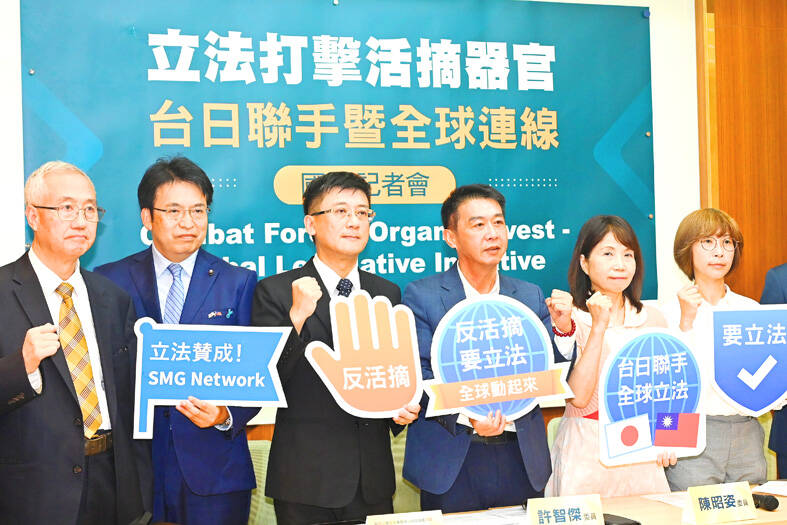Lawmakers from the governing and opposition parties have jointly proposed a bill to counter forced organ harvesting, with serious offenses punishable by life in prison or the death penalty.
As exploitation of people for organs by scam syndicates in some areas of the world such as China has been rampant, the Democratic Progressive Party (DPP), Chinese Nationalist Party (KMT) and Taiwan People’s Party (TPP) legislators proposed the draft bill tentatively named the “act on combating and preventing forced organ harvesting” (打擊及防制活摘器官法).
DPP Legislator Hsu Chih-chieh (許智傑), KMT Legislator Lin Szu-ming (林思銘) and TPP Legislator Chen Gau-tzu (陳昭姿) said in the proposal that international human rights organizations, the US Congress, the European Parliament and the UN have been raising awareness of forced organ harvesting, which is a crime against humanity.

Photo: Wang Yi-sung, Taipei Times
The bill was drafted because some people tricked into working for scammers overseas have been victims of forced organ harvesting and other exploitation, they said.
According to the draft bill, people who committed forced harvesting of organs or tissues from a living person via threats, violence, intimidation, deception or other means against the will of the person would be punishable by imprisonment of at least seven years, with a fine of not less than NT$1 million (US$30,562) and up to NT$12 million.
If the commission of such offenses results in the death of the victim, offenders would be given the death penalty, a life sentence or imprisonment of at least 12 years, with a fine of not less than NT$3 million and up to NT$30 million, it says.
If severe bodily harm results, offenders would be handed a life sentence or imprisonment of at least 10 years, with a fine of not less than NT$2 million and up to NT$20 million, it says.
The draft bill also stipulates punishments for 10 related criminal offenses, such as transplanting harvested organs or tissues from one person to another, storing or transporting harvested organs or tissues, and operating, managing or maintaining facilities where the victim is confined.
Such offenders would be given a prison sentence of at least five years and up to 12 years, with a fine of not less than NT$1 million and up to NT$10 million, it says.
To encourage reporting of the offenses, whistle-blowers would be rewarded and protected in accordance with procedures formulated by the Executive Yuan, it says.
As the industrial chain of forced organ harvest is thriving in China, civil servants and medical practitioners, including doctors, nurses and all other healthcare personnel, would not be permitted to visit China, Hong Kong or Macau to conduct or assist with organ transplantation, it says, adding that offenders would have their eligibility as a professional and a practitioner permanently revoked.
The act would be applicable to anyone who is involved in the commission of forced organ harvesting within the territory of the Republic of China, whether they are local Taiwanese, people from China, Hong Kong or Macau, or foreigners, the draft bill says.

An essay competition jointly organized by a local writing society and a publisher affiliated with the Chinese Communist Party (CCP) might have contravened the Act Governing Relations Between the People of the Taiwan Area and the Mainland Area (臺灣地區與大陸地區人民關係條例), the Mainland Affairs Council (MAC) said on Thursday. “In this case, the partner organization is clearly an agency under the CCP’s Fujian Provincial Committee,” MAC Deputy Minister and spokesperson Liang Wen-chieh (梁文傑) said at a news briefing in Taipei. “It also involves bringing Taiwanese students to China with all-expenses-paid arrangements to attend award ceremonies and camps,” Liang said. Those two “characteristics” are typically sufficient

A magnitude 5.9 earthquake that struck about 33km off the coast of Hualien City was the "main shock" in a series of quakes in the area, with aftershocks expected over the next three days, the Central Weather Administration (CWA) said yesterday. Prior to the magnitude 5.9 quake shaking most of Taiwan at 6:53pm yesterday, six other earthquakes stronger than a magnitude of 4, starting with a magnitude 5.5 quake at 6:09pm, occurred in the area. CWA Seismological Center Director Wu Chien-fu (吳健富) confirmed that the quakes were all part of the same series and that the magnitude 5.5 temblor was

The brilliant blue waters, thick foliage and bucolic atmosphere on this seemingly idyllic archipelago deep in the Pacific Ocean belie the key role it now plays in a titanic geopolitical struggle. Palau is again on the front line as China, and the US and its allies prepare their forces in an intensifying contest for control over the Asia-Pacific region. The democratic nation of just 17,000 people hosts US-controlled airstrips and soon-to-be-completed radar installations that the US military describes as “critical” to monitoring vast swathes of water and airspace. It is also a key piece of the second island chain, a string of

The Central Weather Administration has issued a heat alert for southeastern Taiwan, warning of temperatures as high as 36°C today, while alerting some coastal areas of strong winds later in the day. Kaohsiung’s Neimen District (內門) and Pingtung County’s Neipu Township (內埔) are under an orange heat alert, which warns of temperatures as high as 36°C for three consecutive days, the CWA said, citing southwest winds. The heat would also extend to Tainan’s Nansi (楠西) and Yujing (玉井) districts, as well as Pingtung’s Gaoshu (高樹), Yanpu (鹽埔) and Majia (瑪家) townships, it said, forecasting highs of up to 36°C in those areas